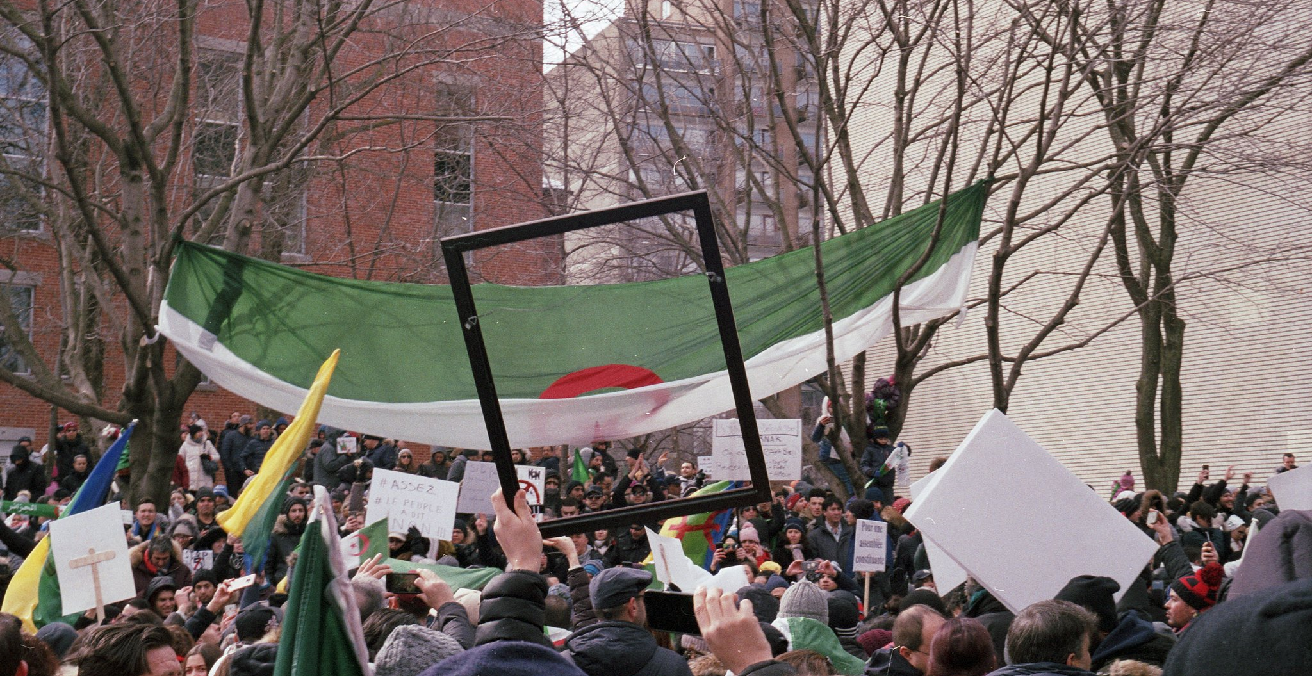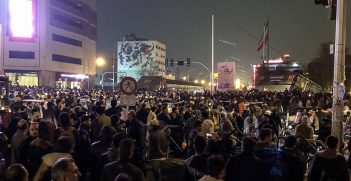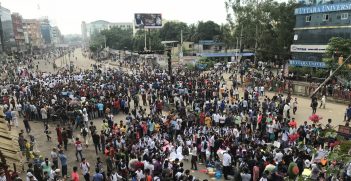Algeria: The Hirak and COVID-19

Despite the campaign of repression against political advocates and journalists in Algeria, and though divided, the Hirak is still alive. Pursuing contradictory government policies, the authorities have failed to convince citizens that the “New Algeria” is different from Bouteflika’s authoritarian regime.
It’s been almost a year since the Algerian Hirak, a peaceful popular movement, decided to suspend their weekly Friday and Tuesday marches organised by the general public and by students, respectively. This was justified as a civic duty to contain the pandemic, which had spread to Algeria in March 2020. To recall, on February 22, 2019, the Hirak brought together millions of Algerians from all walks of life and from divergent political tendencies calling for the removal from office of president Abdelaziz Bouteflika, who was seeking a fifth term in office despite his poor health and rare public appearances. Under pressure from the Hirak and fighting within the regime, the military forcibly ended Bouteflika’s 20-year dictatorial rule on 2 April 2019. However, this did not end the marches of the protesters nor their demand for democratic rule and the dismantlement of the political and economic system established after the country’s independence in 1962.
The Hirak’s demand for genuine change was unyielding. They made clear that Algerians would not be content with half-measures or cosmetic reforms as had happened in the past when successive regimes used subterfuges to preserve the system without real transformation. The controversial election on 12 December 2019 of Abdelmadjid Tebboune, a former minister and prime minister under Bouteflika, exacerbated the political crisis and the legitimacy of the regime. While the pandemic represented a real danger for the population in a country where the health system is deplorable, it was a blessing for the authorities, who introduced restrictive measures, including the banning of marches, the imposition of curfews, and lockdowns to contain it.
Considering the nationwide mass protests and his own statements, one would have expected Tebboune to embark on genuine reforms. Instead, while he praised the Hirak as a “blessed” movement and promised to institutionalise the rule of law, he has carried on the authoritarian rule of his predecessors, while, paradoxically, boasting about the democratic advances of the “New Algeria,” a slogan repeated ad nausea by the new regime’s clientele.
The Hirak and Repression against Activists
Soon after the pandemic reached Algeria, the authorities released thousands of prisoners to avoid contagion in prisons. However, the president showed no such clemency towards prisoners of conscience and political activists. Hirak activists and journalists continue to be imprisoned. Two years after the Hirak protests began, police and judicial intimidation and harassment have continued unabated. The government has also restricted the political and media space significantly, even though freedom of the press does exist and is better than in most Middle East and North African countries.
Unquestionably, the authorities have taken advantage of the COVID-19 pandemic to harden repression in the hope of putting an end to the Hirak. The case of the journalist Khaled Drareni is only one among many that illustrate such repression. He was sentenced at first instance in August 2020 to three years in prison, as authorities were exasperated by his active role on social networks and in the independent Algerian media. On appeal, his sentence was reduced to two years in September, and he henceforth lodged an appeal in cassation before the Supreme Court. His case is being reviewed again and he may stand a new trial in late February.
As well, Kechida was arrested at the end of April 2020, sentenced to three years in prison at first instance in December. He was accused of “insulting a constituted body,” “insulting and offending the President of the Republic,” and “offending the precepts of religion.” However, on 31 January 2021, he was sentenced to one year in prison, six months of which were served during his pre-trial detention, and he was freed the same day.
It is reported that more than 90 people are currently imprisoned in connection with the Hirak protests and/or individual liberties, prosecuted because of their publications on social networks critical of the authorities. This repression is surprising because it contradicts the authorities’ public pronouncements on the “New Algeria” and the desire to turn the page from the practices of the past. It is difficult to decrypt such behavior. At the same time, the authorities have imprisoned and imposed heavy sentences on dozens of ministers, high-ranking military officers, and two former prime ministers. One can only hypothesise that this repression is meant to signal to the remnants of the Bouteflika regime that they are not the only targets of the new regime. The other possible explanation is the discord at the heights of power between conservatives not tolerating criticism and “liberals” who argue that to persuade Algerians of the New Algeria, authorities must instead appease the situation by ending repression and freeing all political prisoners and prisoners of opinion.
Although the Hirak is still active, there is a split between at least two trends. The first relates to Nida 22, a movement that brings together activists and academics to reflect on how to follow up on the dynamics of the Hirak. The second is Al-massar al-jadid (new path), a movement of activists which seeks a synthesis between the Hirak and the incumbent power. So far, according to an eminent Algerian journalist, “this popular protest movement has not succeeded in constructing precise and structured alternatives to end the crisis, the feasibility of which would have defied the decisions of the authorities.”
The New Regime and its Roadmap
Faced with political, economic, and social constraints, the current regime has so far failed to eliminate the conditions that had generated the Hirak. Instead of creating the conditions for a representation of the Hirak and involving it in political decisions, it has not only imposed its own roadmap but has also sought to take advantage of the pandemic to break the Hirak and rejuvenate the old system. Soon after Bouteflika had been removed, the head of the Chiefs of Staff, Ahmed Gaïd-Salah, had rejected the consensus approach and the holding of the national conference on the representativeness of the Hirak and how to involve it in all the political decisions that had to be taken in a “consensual” manner to solve the country’s problems. Instead, he insisted the regime have a presidential election, a new constitution, a new electoral code, and then a legislative election.
The election of Tebboune saw a very low turnout. Participation in the referendum of the new constitution was merely 23.7 percent, of whom 66.8 percent approved the proposed constitution. Although the Hirak is inscribed in the new Constitution, the low participation in the vote was a clear rebuke of the regime’s roadmap. All these changes are being approved by the old parliament, a mediocre institution whose members have been either coopted or bought their seats. Clientelism is the hallmark of this rubber-stamping legislature.
The absence of the president for illness has produced a situation of déjà vu reminiscent of the Bouteflika’s final seven years in office. The country is also facing a severe economic crisis. Peaceful demonstrations have begun to take place in some parts of the country. The slogans show clearly that Algerians are awaiting genuine socio-economic and political change. The government has limited resources and cannot buy social peace as it usually does when the oil rent is high. Therefore, unless it initiates appeasement measures, it will face even more challenging times.
Yahia H. Zoubir is Professor of International Relations and International Management and Director of Research in Geopolitics at KEDGE Business School, France. He taught at multiple universities in the United States and was a visiting faculty member at various universities in China, Europe, the United States, India, Indonesia, South Korea, the Middle East, and North Africa. His recent book is Algerian Politics: Domestic Issues & International Relations (Routledge 2020).
This article is published under a Creative Commons License and may be republished with attribution.





